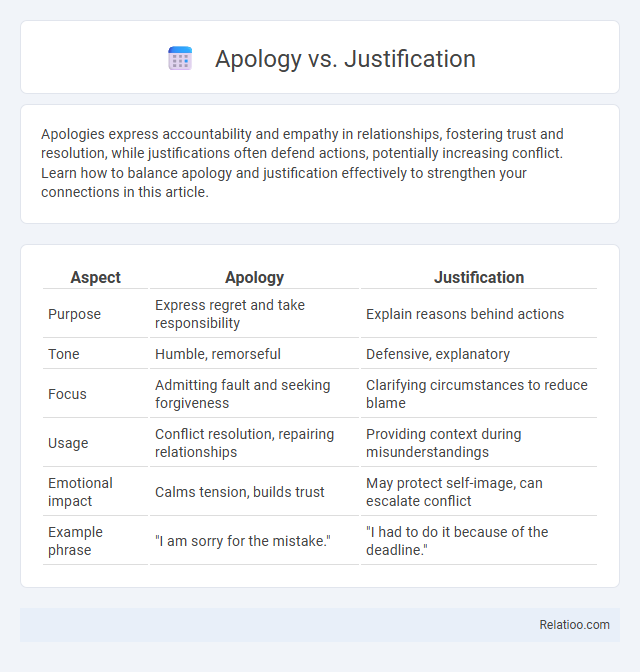Apologies express accountability and empathy in relationships, fostering trust and resolution, while justifications often defend actions, potentially increasing conflict. Learn how to balance apology and justification effectively to strengthen your connections in this article.
Table of Comparison
| Aspect | Apology | Justification |
|---|---|---|
| Purpose | Express regret and take responsibility | Explain reasons behind actions |
| Tone | Humble, remorseful | Defensive, explanatory |
| Focus | Admitting fault and seeking forgiveness | Clarifying circumstances to reduce blame |
| Usage | Conflict resolution, repairing relationships | Providing context during misunderstandings |
| Emotional impact | Calms tension, builds trust | May protect self-image, can escalate conflict |
| Example phrase | "I am sorry for the mistake." | "I had to do it because of the deadline." |
Understanding Apology and Justification
Understanding apology involves recognizing expressions of remorse and acceptance of responsibility for a mistake, fostering trust and emotional repair in interpersonal communication. Justification, in contrast, focuses on providing reasons or explanations to defend actions without admitting fault, often aiming to mitigate perceived blame or consequences. Differentiating between apology and justification is crucial for effective conflict resolution, as the former promotes empathy and accountability, while the latter can sometimes create distance or defensiveness.
Key Differences Between Apology and Justification
An apology expresses remorse and acknowledges responsibility for a mistake or wrongdoing, while a justification attempts to explain or defend the behavior without admitting fault. Your communication becomes more empathetic and effective when you offer an apology, fostering trust and understanding, whereas justification can sometimes appear as avoiding accountability. Understanding this key difference helps you navigate conflicts and maintain stronger relationships.
Psychological Basis of Apologizing
Apologies stem from an acknowledgment of wrongdoing, aiming to restore trust and mend relationships by expressing remorse and empathy, which activates your brain's social bonding centers. Justifications involve explaining the reasons behind actions, often to protect self-esteem and reduce cognitive dissonance, but they may hinder emotional reconciliation. Understanding these psychological bases helps you choose whether to offer a genuine apology, provide context, or combine both for effective conflict resolution.
The Role of Justification in Conflict Resolution
Justification serves as a critical tool in conflict resolution by providing context and reasoning behind actions, helping parties understand motives without necessarily admitting fault. Unlike apologies, which express remorse and acknowledge wrongdoing, justification emphasizes explanation and perspective, often reducing defensiveness in disputes. Effective use of justification can facilitate communication, promote empathy, and pave the way for constructive dialogue and eventual reconciliation.
Impact on Relationships: Apology vs Justification
Apology strengthens relationships by demonstrating accountability and empathy, fostering trust and emotional connection. Justification, however, may create defensiveness or misunderstanding, potentially damaging your bond by shifting focus from reconciliation to excuse-making. Choosing apology over justification enhances mutual respect and promotes healthier, more resilient interactions.
When to Apologize and When to Justify
Apologize when taking responsibility for a mistake or harm caused, expressing regret to repair relationships and demonstrate empathy. Justify when explaining reasons or context behind an action without admitting fault, aiming to clarify misunderstandings or defend decisions. Navigating when to apologize versus justify hinges on assessing accountability, impact on others, and the goal of maintaining trust or providing insight.
Social Perceptions of Apology and Justification
Social perceptions of apology emphasize sincerity and responsibility, often fostering trust and reconciliation by acknowledging wrongdoing. Justification is viewed as an explanation that may shift blame or reduce perceived fault, potentially leading to mixed reactions depending on context and audience interpretation. Apology combined with justification can either dilute the sincerity of the apology or provide necessary context that enhances understanding and social harmony.
Cultural Variations in Apology and Justification
Cultural variations significantly influence how apology and justification are expressed and interpreted across societies, with some cultures valuing direct apologies while others prioritize explanations to maintain social harmony. In collectivist cultures, your acknowledgment of fault often involves elaborate apologies emphasizing group cohesion, whereas individualistic cultures may favor straightforward justifications that highlight personal accountability. Understanding these cultural differences is crucial for effective communication and avoiding misunderstandings in cross-cultural interactions.
Common Pitfalls: Over-Apologizing vs Over-Justifying
Over-apologizing often diminishes personal credibility and can signal a lack of confidence, while over-justifying may come across as defensive or insincere, eroding trust in communication. Effective communication balances acknowledgment of mistakes with accountability, avoiding excessive apologies or explanations that dilute the message. Understanding the context and audience is crucial to tailor responses that maintain professionalism and clarity without undermining one's position.
Best Practices for Effective Communication
Effective communication requires distinguishing between apology, justification, and excuse to maintain trust and clarity. Apology involves acknowledging responsibility and expressing regret, fostering empathy and resolution, while justification explains reasons without denying fault, which may sometimes be perceived as deflective. Your best practice is to prioritize sincere apologies when appropriate, clarify context with explanations as needed, and avoid excuses that undermine accountability.

Infographic: Apology vs Justification
 relatioo.com
relatioo.com